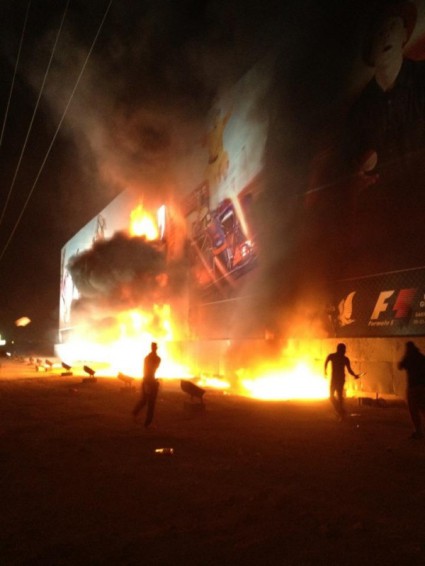Situation heats up as King Hamad’s faltering regime holds Grand Prix Hostage
Bahrain unrest intensifies ahead of Grand Prix
Lara Sukhtian (AFP) – 19 April, 2012
DUBAI — As Bahrain prepares to host this weekend’s Formula One Grand Prix, demands by protesters for democratic change are intensifying and the government position is hardening, setting the Gulf kingdom on a path to confrontation, analysts say.
Shiite-led street demonstrations have turned increasingly violent, as the ruling Sunni Khalifa dynasty continues its crackdown on dissent in a desperate effort to portray that all is well in the island kingdom ahead of Sunday’s race.
Regional allies, mainly Saudi Arabia, are lending the Khalifas a helping hand, while the United States has mostly turned a blind eye to the unrest, two key factors, analysts say, that have contributed to the current unrest.
The crisis is set against the backdrop of escalating tensions between Saudi Arabia and Iran, both of which see the success, or failure, of Bahrain’s protests as a key piece of the puzzle in regional hegemony.
There is a “pretty clear escalation,” said Joost Hiltermann of the International Crisis Group, which this week released a conflict risk alert on Bahrain.
Several factors are feeding fears of escalating unrest, he argued.
“The (political) stalemate is continuing,” and a steady pace of protests are ending in clashes, as protesters use fire bombs and security forces use tear gas and pellet guns, Hiltermann added.
According to Amnesty International, at least 60 people have been killed since the explosion of Bahrain’s Arab Spring-style uprising in February 2011.
Bahrain’s majority Shiites claim discrimination and marginalisation by the Sunni monarchy, and recent promises of reform by King Hamad have not been implemented, while attempts at a national dialogue with the opposition have amounted to nothing.
And as Formula One teams arrive in the kingdom, the opposition and the increasingly radical youth are calling for mass protests, using the world famous sporting event to shed light on their struggle.
For its part, the government is beefing up security and arresting activists, hoping to contain the unrest during the race.
Meanwhile, the deteriorating health of a prominent Shiite activist, Abdulhadi Khawaja, on hunger strike since early February, is yet another ticking time bomb.
It all makes “for a heavy brew,” said Hiltermann, warning that although the uprising is very much a local issue, it is especially dangerous because it has wider regional ramifications.
“A key factor here is the US. It doesn’t want to rock the boat because Bahrain is a critical link in its Gulf security architecture,” he said, adding that the Saudis too “are major power brokers…and have (Bahrain) by the throat economically.”
Bahrain’s crisis has unleashed long-standing fears among Sunni Gulf monarchies that a Shiite revolution in the kingdom would give Iran a foothold in the heart of the Arab Gulf. …more































Add facebook comments
Kick things off by filling out the form below.
Leave a Comment